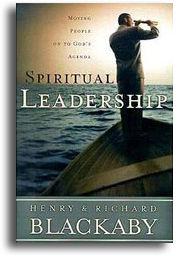Spiritual Leadership - A MinistryLift Recommended Book
 “Spiritual leadership is moving people unto God’s agenda” (p. 36). In their 2011 expanded revision of Spiritual Leadership, Henry and Richard Blackaby have done a masterful job of calling Christian leaders to refocus on God and His agenda while giving many practical tools for helping them move people according to God’s leading. They have integrated Scripture and contemporary ideas about leadership throughout the book while bringing their ideas to life through many engaging stories. Despite a few underlying assumptions that some readers might find unsettling, the book is a thought-provoking and practical read for both seasoned and emerging leaders alike.
“Spiritual leadership is moving people unto God’s agenda” (p. 36). In their 2011 expanded revision of Spiritual Leadership, Henry and Richard Blackaby have done a masterful job of calling Christian leaders to refocus on God and His agenda while giving many practical tools for helping them move people according to God’s leading. They have integrated Scripture and contemporary ideas about leadership throughout the book while bringing their ideas to life through many engaging stories. Despite a few underlying assumptions that some readers might find unsettling, the book is a thought-provoking and practical read for both seasoned and emerging leaders alike.
Henry and Richard Blackaby, in their expanded revision of Spiritual Leadership published in 2011, contend that “leadership occurs when you move people from where they are to where they ought to be” as God leads. A strong theme throughout the book is that leaders who want to lead in God-honouring ways must hear from God and obey His voice. Spiritual leadership necessitates an intimacy with God that allows leaders to hear from Him as they make decisions throughout the day. The authors state that “the most crucial objective for any leader is personal growth” (p. 51). A major strength of the book is its strong call to recapture a high view of God’s role in guiding Christian leaders – a role sometimes dominated by human reasoning and leadership best practices.
Spiritual Leadership successfully integrates theological reflection with practical application. It has a robust theoretical foundation built on Scripture and insights from the leadership literature. Yet, the book is also very practical. The authors devote chapters to important leadership topics such as the character of spiritual leaders, how God prepares leaders, making decisions, building teams, getting and communicating vision, and the pitfalls of leadership. As I read the book, I found myself re-examining my own leadership theology and some of my leadership practices. I felt a longing to lead with a deeper form of spiritual leadership. I found myself thinking about how I might lead differently in the future. I suspect that the book would deeply challenge the thinking of most Christian leaders and would give them tools that they can readily use to strengthen their leadership.
The Blackaby’s use many captivating stories to bring concepts to life. Unfortunately, most of the characters in these stories are male. I also noted that the authors often used American presidents as examples, which gave the book a decidedly U.S.-centric feel . At times, they also relied on military heroes to portray their points, which some readers may find distracting.
